北京市西城区2011年初三一模试卷英语听力录音原文
2024年北京市西城区中考一模英语试题(解析版)

北京市西城区九年级统一测试试卷英语2024. 4考生须知1. 本试卷共11页,共两部分,共38题。
满分60分。
考试时间90分钟。
2. 在试卷和草稿纸上准确填写姓名、准考证号、考场号和座位号。
3. 试题答案一律填涂或书写在答题卡上,在试卷上作答无效4. 在答题卡上,选择题用2B铅笔作答,其他试题用黑色字迹签字笔作答5. 考试结束,请将本试卷、答题卡和草稿纸一并交回第一部分本部分共33题,共40分。
在每题列出的四个选项中,选出最符合题目要求的一项。
一、单项填空(每题0. 5分,共6分)从下面各题所给的A、B、C、D四个选项中,选择可以填入空白处的最佳选项。
1. My sister likes drawing and ________ wants to be an artist in the future.A. sheB. heC. itD. they【答案】A【解析】【详解】句意:我姐姐喜欢画画,她将来想成为一名艺术家。
考查代词辨析。
she她;he他;it它;they他们。
此处指代“我姐姐”,用代词she。
故选A。
2. I like listening to music while exercising _______ the park.A. onB. underC. inD. to【答案】C【解析】【详解】句意:我喜欢在公园边锻炼边听音乐。
考查介词辨析。
on在……上;under在……下;in在……里;to到。
根据“the park”可知是在公园里,应用介词in。
故选C。
3. —Would you like more pizza, Linda?—No, thanks. The pizza is delicious ________ I’m full.A. ifB. butC. becauseD. or【详解】句意:——琳达,你还想再来点披萨吗?——不,谢谢。
披萨很好吃,但我已经饱了。
考查连词辨析。
if如果;but但是;because因为;or或者。
2016年西城区初三一模试卷英语(word解析版)
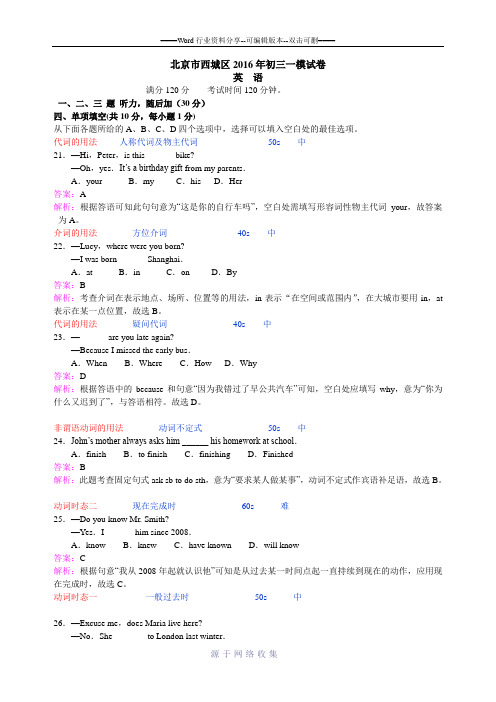
北京市西城区2016年初三一模试卷英语满分120分考试时间120分钟。
一、二、三题听力,随后加(30分)四、单项填空(共10分,每小题1分)从下面各题所给的A、B、C、D四个选项中,选择可以填入空白处的最佳选项。
代词的用法人称代词及物主代词50s 中21.—Hi,Peter,is this ______ bike?—Oh,yes.It’s a birthday gift from my parents.A.your B.my C.his D.Her答案:A解析:根据答语可知此句句意为“这是你的自行车吗”,空白处需填写形容词性物主代词your,故答案为A。
介词的用法方位介词40s 中22.—Lucy,where were you born?—I was born ______ Shanghai.A.at B.in C.on D.By答案:B解析:考查介词在表示地点、场所、位置等的用法,in表示“在空间或范围内”,在大城市要用in,at 表示在某一点位置,故选B。
代词的用法疑问代词40s 中23.—______ are you late again?—Because I missed the early bus.A.When B.Where C.How D.Why答案:D解析:根据答语中的because和句意“因为我错过了早公共汽车”可知,空白处应填写why,意为“你为什么又迟到了”,与答语相符。
故选D。
非谓语动词的用法动词不定式50s 中24.John’s mother always asks him ______ his homework at school.A.finish B.to finish C.finishing D.Finished答案:B解析:此题考查固定句式ask sb to do sth,意为“要求某人做某事”,动词不定式作宾语补足语,故选B。
动词时态二现在完成时60s 难25.—Do you know Mr. Smith?—Yes.I ______ him since 2008.A.know B.knew C.have known D.will know答案:C解析:根据句意“我从2008年起就认识他”可知是从过去某一时间点起一直持续到现在的动作,应用现在完成时,故选C。
北京市西城区2016年中考一模英语试卷(含答案)
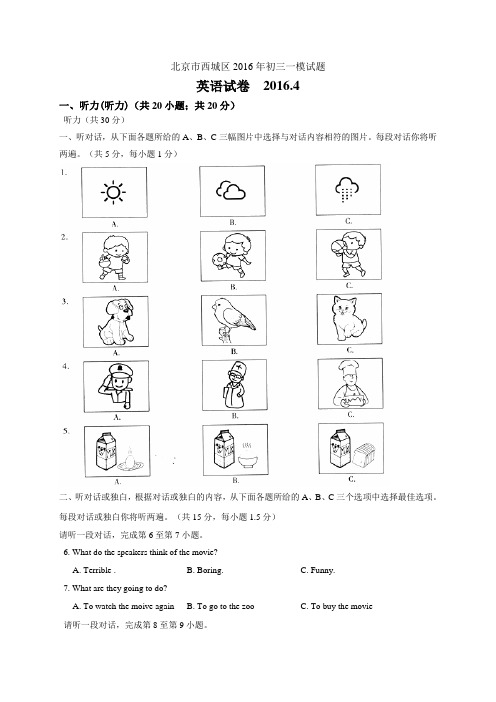
北京市西城区2016年初三一模试题英语试卷2016.4一、听力(听力)(共20小题;共20分)听力(共30分)一、听对话,从下面各题所给的A、B、C三幅图片中选择与对话内容相符的图片。
每段对话你将听两遍。
(共5分,每小题1分)二、听对话或独白,根据对话或独白的内容,从下面各题所给的A、B、C三个选项中选择最佳选项。
每段对话或独白你将听两遍。
(共15分,每小题1.5分)请听一段对话,完成第6至第7小题。
6. What do the speakers think of the movie?A. Terrible .B. Boring.C. Funny.7. What are they going to do?A. To watch the moive againB. To go to the zooC. To buy the movie请听一段对话,完成第8至第9小题。
8. What did the girl buy?A. A dogB. A walletC. A picture9. How much did the girl pay?A. $20.B. $25.C. $40.请听一段对话,完成第10至第11小题。
10. What‘s wrong with the man?A. He has a feverB. He has a headacheC. He has a toothache11. What does the woman suggest doing?A. Having a good rest.B. Taking his temperature.C. Taking some medicine.请听一段对话,完成第12至第13小题。
12. Why does the woman want to see Paul?A. He doesn‘t do well in his studiesB. He doesn‘t practice soccer after classC. He doesn‘t want to volunteer at school13. What does Paul decide to do?A. To get up earlyB. To stop watching TVC. To give up his job请听一段独白,完成第14至第15小题。
2011-2012年北京市西城区初三第一学期英语期末考试试题及答案

北京市西城区2011—2012学年度第一学期期末试卷九年级英语2012。
1听力理解(共24分)一、听对话,从下面各题所给的A、B、C三幅图片中选择与对话内容相符的图片。
每段对话读两遍。
(共4分,每小题1分)1.A。
B. C。
2.A。
B。
C。
3。
A。
B. C。
4。
A。
B. C。
二、听对话或独白,根据对话或独白内容,从下面各题所给的A、B、C三个选项中选择最佳选项。
每段对话或独白读两遍。
(共12分,每小题1分)请听一段对话,完成第5至第6小题。
5。
What are they talking about?A. Their plans for the holiday. B。
Their homework. C. The weather。
6。
What is the girl going to do?A. Visit some cities. B。
Travel with Mike. C. Stay at home。
请听一段对话,完成第7至第8小题。
7. Where did the boy get hurt?A。
At his house。
B。
At Julia's house。
C。
On his way to school。
8。
What will the woman do first?A。
Take the boy to the hospital. B. Give the doctor a call。
C. Ask Julia for help.请听一段对话,完成第9至第10小题.9. What does George do?A。
He is a reporter。
B. He is an English teacher。
C。
He is a postman。
10. Who is the richest person in the city?A。
George。
B。
Peter Gates。
C。
The woman.请听一段对话,完成第11至第13小题。
2011北京海淀中考一模英语(含解析)
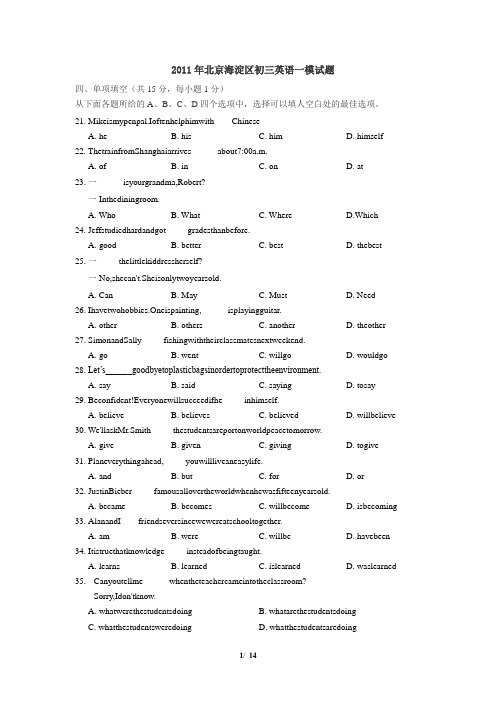
2011年北京海淀区初三英语一模试题四、单项填空(共15分,每小题1分)从下面各题所给的A、B、C、D四个选项中,选择可以填人空白处的最佳选项。
21. Mikeismypenpal.Ioftenhelphimwith____ChineseA. heB. hisC. himD. himself22. ThetrainfromShanghaiarrives______about7:00a.m.A. ofB. inC. onD. at23. 一______isyourgrandma,Robert?一Inthediningroom.A. WhoB. WhatC. WhereD.Which24. Jeffstudiedhardandgot_____gradesthanbefore.A. goodB. betterC. bestD. thebest25. 一_____thelittlekiddressherself?一No,shecan't.Sheisonlytwoyearsold.A. CanB. MayC. MustD. Need26. Ihavetwohobbies.Oneispainting,______isplayingguitar.A. otherB. othersC. anotherD. theother27. SimonandSally_____fishingwiththeirclassmatesnextweekend.A. goB. wentC. willgoD. wouldgo28. Let’s______goodbyetoplasticbagsinordertoprotecttheenvironment.A. sayB. saidC. sayingD. tosay29. Beconfident!Everyonewillsucceedifhe_____inhimself.A. believeB. believesC. believedD. willbelieve30. We'llaskMr.Smith_____thestudentsareportonworldpeacetomorrow.A. giveB. givenC. givingD. togive31. Planeverythingahead,_____youwillliveaneasylife.A. andB. butC. forD. or32. JustinBieber_____famousallovertheworldwhenhewasfifteenyearsold.A. becameB. becomesC. willbecomeD. isbecoming33. AlanandI____friendseversincewewereatschooltogether.A. amB. wereC. willbeD. havebeen34. Itistruethatknowledge_____insteadofbeingtaught.A. learnsB. learnedC. islearnedD. waslearned35. --Canyoutellme______whentheteachercameintotheclassroom?--Sorry,Idon'tknow.A. whatwerethestudentsdoingB. whatarethestudentsdoingC. whatthestudentsweredoingD. whatthestudentsaredoing五,完型填空(共12分,每小题1分)阅读下面的短文,掌握其大意,然后从短文后各题所给的A,B,C, D四个选项中,选择最佳选项。
中考英语听力模拟试题(一)含听力音频MP3文件听力材料原文

中考英语听力模拟试题(一)含听力音频MP3文件听力材料原文中考英语听力模拟试题(一)Ⅰ.听句子,选出与所听句子内容相匹配的图画,每题读一遍1.B2.C3.A4.D5.EⅡ.录音中有五组对话,每组对话听两遍,然后从每小题A、B、C中选出能回答每个问题的正确答案。
XXX.7.A。
Next XXX.8.C。
On Sunday.9.A。
She would rather not go.10.B。
For three days.Ⅲ.听长对话,然后回答每段对话后提出的问题。
每段对话读两遍。
11.A。
At home.XXX.13.C。
The English club.14.B。
For an hour and a half.15.A。
XXX.Ⅳ.录音中有一篇短文,听短文两遍,然后从每小题A、B、C中选出能回答每个问题的正确答案。
A: The correct time is 10:20.7.M: Have you finished your homework yet。
Jane?W: No。
I haven’t。
I’m still working on it.Q: Has Jane finished her homework?A: No。
she hasn’t.8.M: Excuse me。
could you tell me how to get to the nearest post office?W: Sure。
go straight ahead for two blocks and turn left。
It’s on your right.Q: Where is the post office?A: It’s on the right after turning left two blocks ahead.9.M: How was the movie last night?W: It was terrible。
I fell asleep in the middle of it.Q: Did the woman enjoy the movie?A: No。
北京市西城区高三英语试卷听力部分录音稿与标准答案1
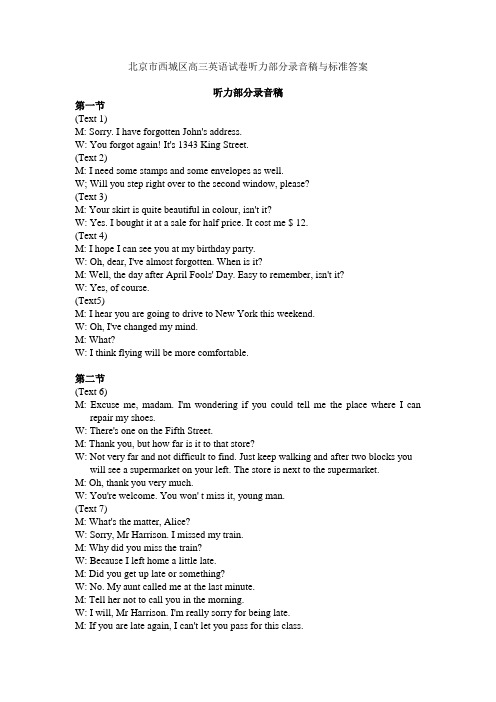
北京市西城区高三英语试卷听力部分录音稿与标准答案听力部分录音稿第一节(Text 1)M: Sorry. I have forgotten John's address.W: You forgot again! It's 1343 King Street.(Text 2)M: I need some stamps and some envelopes as well.W; Will you step right over to the second window, please?(Text 3)M: Your skirt is quite beautiful in colour, isn't it?W: Yes. I bought it at a sale for half price. It cost me $ 12.(Text 4)M: I hope I can see you at my birthday party.W: Oh, dear, I've almost forgotten. When is it?M: Well, the day after April Fools' Day. Easy to remember, isn't it?W: Yes, of course.(Text5)M: I hear you are going to drive to New York this weekend.W: Oh, I've changed my mind.M: What?W: I think flying will be more comfortable.第二节(Text 6)M: Excuse me, madam. I'm wondering if you could tell me the place where I can repair my shoes.W: There's one on the Fifth Street.M: Thank you, but how far is it to that store?W: Not very far and not difficult to find. Just keep walking and after two blocks you will see a supermarket on your left. The store is next to the supermarket.M: Oh, thank you very much.W: You're welcome. You won' t miss it, young man.(Text 7)M: What's the matter, Alice?W: Sorry, Mr Harrison. I missed my train.M: Why did you miss the train?W: Because I left home a little late.M: Did you get up late or something?W: No. My aunt called me at the last minute.M: Tell her not to call you in the morning.W: I will, Mr Harrison. I'm really sorry for being late.M: If you are late again, I can't let you pass for this class.W: Oh, please.(Text 8)M: What seems to be the matter?W: I just can't sleep well, doctor.M: I see. And how long have you had this problem?W: Oh, for about two weeks now.M: Two weeks. Do you have headaches?W: Sometimes.M: Fever?W: No.M: Are you having any family problems?W: No, not really. We all get along pretty well.M: And how about work ?W: Well, I've been working a lot lately——more than 11 hours a day.M: Maybe you should take a vacation and just rest for a few days.W: Well, I can't right now. We're in the middle of some important business.M: Yes, I understand, but you really need to slow down. You're going to kill your self if you go on like this.(Text 9)M: What a lot of rubbish and waste! I just wonder how people can deal with these things every day.W: Don't worry. There are many ways of dealing with them. The other day, I heard that a big rubbish plant is being built near our town.M: A rubbish plant? To produce rubbish or to deal with rubbish?W: To deal with rubbish, of course.M: How much rubbish can it deal with each day?W: Maybe 3,000 tons, I'm not sure.M: Our town will become cleaner after the plant is built.W: I hope so.(Text 10)You ask me about my hometown, so now I'd like to tell you something about it.I live in Brighton which is not a very big town. It has a population of around 300, 000. It is on the coast about 50 miles from London. Of course it isn' t as interesting as London or Paris. But the air is a lot cleaner and better. There is little pollution there. There are a few factories in Brighton, but not many. It isn't very easy to find a job there. My father used to work in a steel plant which shut down a year ago and my father lost his job. But there are a lot of hotels and language schools in the town. In summer the town is full of travellers. My father decides to open a small shop to sell gifts. But he is short of money. He hopes that he can borrow some money from the bank.试题答案及评分标准第一卷(共l15分)第一部分:听力部分(每小题1.5分,共30分)1—10 CCABC,AABBC 11—20 ACABB,CABCC第二部分:第一节 单项填空(每小题1分,共15分)21—30 DCDAA ,BCBDA 31—35 ACBDA 第二节 完形填空(每小题1.5分,共30分)36—45 DACBA ,DBCCB 46—55 ADDAC ,BBCDA 第三部分:阅读理解(每小题2分,共40分)56—65 ADDBD ,BDABA 66—75 CCBDA ,CBDBA第二卷(共35分)第四部分:写(共两节,满分35分)第一节:短文改错(共10小题,每小题1分,满分10分)We were late as usual. My husband had insisted on watering the flowers in the garden by himself. When we realized how he couldn't manage, he asked me for help. But now we had only an hour to get to the airport.Luckily, there were not many more cars or buses on the road and we were able to get here just in time. Wechecked in and went straight to the big hall to wait for our flight ∧ be called, but no announcement is made. A girl there told us the plane hadn't come yet. In the end there came an announcement told us that the passengers waiting for Flight LJ108 could get the free meal and voucher(凭单) and that the plane hadn't left London for some technical problems.第二节:书面表达(满分25分) 一、评分原则:1.本题总分为25分,按5个档次给分。
北京市西城区2015届九年级上学期期末考试英语试题及答案
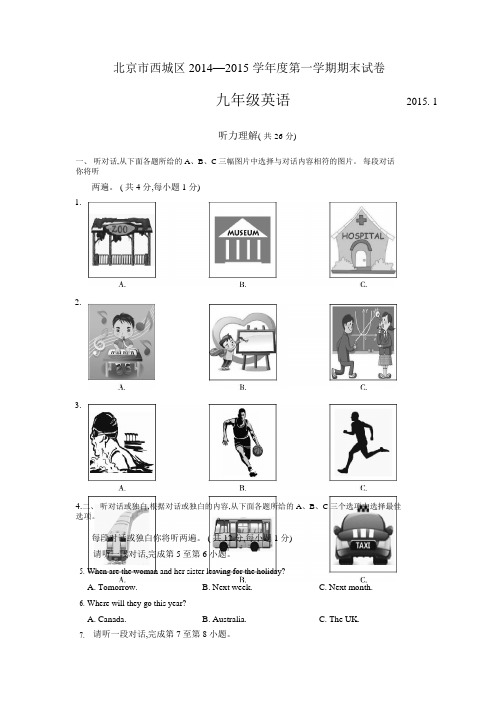
北京市西城区 2014—2015 学年度第一学期期末试卷九年级英语2015. 1听力理解( 共 26 分)一、 听对话,从下面各题所给的 A 、B 、C 三幅图片中选择与对话内容相符的图片。
每段对话你将听两遍。
( 共 4 分,每小题 1 分)1.2.3.4.二、 听对话或独白,根据对话或独白的内容,从下面各题所给的 A 、B 、C 三个选项中选择最佳选项。
每段对话或独白你将听两遍。
( 共 12 分,每小题 1 分) 5. 请听一段对话,完成第 5 至第 6 小题。
When are the woman and her sister leaving for the holiday? C. Next month.6. A. Tomorrow.B. Next week.Where will they go this year?B. Australia.C. The UK.A. Canada.7. 请听一段对话,完成第 7 至第 8 小题。
What does the woman want to do at first? C. Change the gloves.8. A. Return the gloves.B. Try on the gloves.How much will the woman pay to get the gloves she wants?C. $ 6.A. $ 29.B. $ 35.请听一段对话,完成第 9 至第 10 小题。
9. What did the man probably do last night?A. He watched a football game.B. He talked with the woman.C. He did some work on his own.10. How much of the film did the woman see?A. The start of the film.B. The end of the film.C. The whole film.请听一段对话,完成第 11 至第 13 小题。
2023年北京市西城区初三(第1次)模拟考试英语试卷(含解析)

2023年北京市西城区初三(第1次)模拟考试英语试卷一、单选题(本大题共12小题,共12.0分)1. My brother loves birds, and _______ often goes bird-watching in the wild.A. heB. sheC. itD. they2. The best time to visit Beijing is _______ autumn.A. onB. inC. atD. to3. Betty likes dancing, _______ she'd like to join the Dance Club.A. butB. orC. forD. so4. —_______ I do the art project on my own?—No, you don't have to. You can work with your classmates.A. MustB. MayC. CanD. Shall5. —_______ do you plan to go this May Day holiday?—Back to my mom's hometown.A. HowB. WhyC. WhereD. When6. —Mom, do you think that life is _______ today than in the past?—Yes, of course, I do.A. goodB. betterC. bestD. the best7. Look! It ______ outside. Let's take an umbrellaA. is rainingB. was rainingC. rainedD. has rained8. —How was your weekend?—Pretty good! I ______ the Great Wall with my friends.A. climbB. will climbC. climbedD. am climbing9. —Where is John?—I'm not sure. He ______ the violin in the music room when I saw him just now.A. playsB. will playC. is playingD. was playing10. Peter _______ for our community as a volunteer for nearly ten years.A. worksB. is workingC. was workingD. has worked11. The 19th Asian Games _______ in Hangzhou from September 23 to October 8, 2023.A. holdB. heldC. will be heldD. were held12. —Do you know _______ World Book Day this year?—Yes. By writing a review of our favorite books.A. how can we take part inB. how we can take part inC. when can we take part inD. when we can take part in二、完形填空(本大题共8小题,共12.0分)One without the other"I have something important to read to you!" Ava told her parents. "In school, we've been working on persuasive essays(议论文). My teacher said that in order to make people accept your idea, you have to have reasons and evidence (证据). My essay is called Why I Am Responsible and Ready for a Cell Phone."It had been a 13 for months. Ava's parents told her she couldn't have a cell phone until she was thirteen."A cell phone isn't all fun and games," they would say. "And, it is too big a(an) 14 for you to have one right now."But then, a week ago, Ava started working on writing persuasive essays at school.It was like lightning had gone off in Ava's brain.She'd worked on her essay for a week, coming up with all the reasons why she should have a cell phone. She even looked up some 15 to help as supporting evidence. Forty percent(百分之……) of children in her age group have been introduced to cell phones. Fifty-three percent of parents in the country think it's 16 for a child to own a cell phone at her age."Well, Ava, that does make sense," her dad said. "We'll talk it over." Ava wanted to jump up and down. But she was trying to show she was mature (成熟的) enough for a cell phone. So, she just smiled, nodded, and 17 .After a full week, her mom said, "Alright Ava, we are impressed by how much work you put into that essay and how mature you have become. So, you can have a cell phone.""Really?" Ava cried out. She couldn't wait to show her friends and join their chat group. She spent a good hour that first night 18 with them, discussing their weekend plan.On the weekend, Ava went to see a movie with her friends. It was not until Ava got home that she realized something was seriously wrong. Her phone was gone."Did you talk to the theater manager? Maybe someone 19 it in!" her mom said Ava breathed in. "I didn't …"In the end, her parents drove her back to the theater. Luckily, the phone was in the lost-and-found box.Ava thought that maybe she wasn't 20 to have a phone just yet.13. A. problem B. task C. tradition D. pleasure14. A. discovery B. responsibility C. expectation D. project15. A. facts B. suggestions C. experiments D. messages16. A. surprising B. arguable C. acceptable D. interesting17. A. understood B. followed C. stopped D. waited18. A. gaming B. texting C. learning D. shopping19. A. called B. traded C. turned D. pulled20. A. safe B. clear C. lucky D. ready三、阅读理解(本大题共10小题,共20.0分)AEmma's big gameEmma was very excited. Today was the championship(锦标赛) baseball game! Emma really wanted to help her team win a trophy.She put on her clothes, picked up her baseball glove and talked to herself, "I hope I get a hit today."Emma was a great hitter in practice, but she had never hit a ball during a game. She almost always struck out(三振出局).On the way to the field, Emma kept her head down and was silent."Are you feeling okay, Emma?" her mom asked."I really don't want to strike out," Emma said."Don't worry! Just keep your eye on the ball. You can do it," Emma's mom said.When the game started, Emma cheered loudly for her teammates. She caught a fly ball in the outfield to make an out, and everyone cheered for her. Emma struck out when it was her turn to bat(击球), but her team was doing well.The game was tied, and it was her team's last chance to score. Frankie was up first—he hit the ball hard and managed to run to third base. That meant he could score and win the game if the next batter got a good hit. Next up was Henry, and then Kara, but they both struck out. Emma was next up.Emma could feel all the eyes on her as she stepped up to the plate. She closed her eyes and swung(挥) hard, but missed."Keep your eye on the ball, Emma!" her mom called from the stands.Emma nodded and stepped back into the batter's box. This time she kept her eyes wide open and took a deep breath before she swung the bat.Crack!Emma hit the ball! Frankie ran home and they won!"Great game, everyone!" said Emma's coach later. "Here is your trophy."Emma held the shiny trophy high in the air. She felt very proud of her whole team.Most of all, she couldn't wait to show her mom the big trophy.21. On the way to the field, Emma felt ______.A. shyB. proudC. angryD. worried22. What happened after Henry and Kara struck out?A. Frankie scored at once.B. The game stopped for a while.C. Emma stepped up to the plate.D. The team lost the chance to win.23. At the end of the game, Emma was able to get a good hit because _______.A. she was praised by her coachB. she fixed her attention on the ballC. her friends encouraged her to do wellD. her mom helped her practice baseballBIn many ways, our memories define(定义) our sense of self. You first have a sense of yourself early in life, perhaps as young as 18 months, when you recognize that the little baby you see in the mirror is really you, and not another child. As you progress through childhood and into teenage years, you start to develop a set of views about your identity(身份), including how your body looks and performs, your abilities, your personality and your place in society.While we are growing up, we start to create our own descriptions about the events we have gone through, or what I call the "life story". Our identities are shaped by our life stories, as the memories of these stories gradually become a part of our sense of self. Of all these memories, the most important are "self-defining memories". They are remembered most clearly and can help to build up our overall sense of self most greatly.Learning to recognize your own self-defining memories can help you gain important insights about your identity. The easiest way to discover your own self-defining memories is by thinking about the events in your life that you are most likely to tell other people about when they say "tell me a little about yourself".However, self-defining memories are always changing as you experience more events. They may vary according to your age and what you care about in present life.In a study, scientists compared older adults with college students. They found that older adults were more likely to feel more positively(正面地) about their self-defining memories, even if the memories were of events that were negative in nature. A similar study also suggests that older adults have found ways to make sense out of their life stories. They turn memories of troubling events into positive stories, and in this way, they make peace with their past struggles(挣扎). For younger adults, troubling events cause them to experience more pain when they recall them. As scientists have discovered, a self-defining memory does not have to be positive in order for you to grow from it. It's not the event, but the meaning you make out of the event, that affects(影响) your sense of well-being.Discovering your self-defining memories is an important step in dealing with your life experiences. By recognizing and making sense out of past events, your identity can continue to grow and improve how you see yourself, both now, and in the future.24. What can we learn from the passage?A. Our self-defining memories have little to do with age.B. Our own descriptions of life experiences shape our identity.C. We should share positive life stories when introducing ourselves.D. We start to have self-defining memories when we are 18 months old.25. From the studies mentioned in Paragraph 5, we know ______.A. important events can be changed by timeB. older adults have few troubling life eventsC. making sense out of memories helps us to growD. self-discovery happens during positive experiences26. Which would be the best title for the passage?A. Self-defining memories: How others get to know youB. Self-defining memories: A collection of pleasant memoriesC. Self-defining memories: A great way to understand yourselfD. Self-defining memories: Describing your best self to the worldCAwe is the feeling we get in the presence of something vast that challenges our understanding of the world, like looking up at millions of stars in the night sky or shaking hands with a basketball superstar. When people feel awe, they may use other words to talk about the experience, such as wonder, amazement or excitement.We often think about awe when we experience uncommon and extraordinary events, such as viewing a sunrise over the Grand Canyon or watching Olympians break world records. But when scientists study people's experiences of awe, they suggest awe is also found in everyday life—watching a gingko tree change from green to yellow, or seeing a stranger give food to a homeless person.The feeling of awe affects the way we view ourselves. The experience of awe can have a deep influence on our mental(心理的) health, by allowing us to put our worries into perspective. When we are in the presence of something vast and indescribable, we feel unimportant, and so do our worries. The experience of awe lifts us out of the common practical thoughts that control our daily lives. and it allows us to have inner peace.In areas where the population can easily get to beautiful green spaces, people report greater happiness and goodwill toward others. A study showed that older adults who took weekly 15-minute outdoor walks in nature for eight weeks reported increased positive emotions and less pain in their daily lives.People in awe are more likely to show kindness and feel a greater sense of connection to others and the world. In moments of awe, we direct ourselves from the sense that we are solely(独自地) in control of our own future to the feeling we are part of a community. When we give less attention to our own goals and needs, we are more likely to be able to notice others and what they may be experiencing.In sum, awe arises when we run into the wonders of life and leads to a disappearing of the self. Stepping outside of oneself is a valuable skill. It is possible to find awe-inspiring moments in all different places. Therefore, actively look for the experiences that feed your own hunger for awe, be it through admiring the trees in your neighborhood, or seeing the goodness in others. Take the time to slow down and open your mind to those things which you do not fully understand. You will be the better for it—and, as your feelings of awe spread through acts of kindness, so will the rest of us.27. What can we learn from the passage?A. Meeting strangers often brings feelings of excitement.B. Even common daily events can lead to the feeling of awe.C. Uncommon events are usually related to the beauty of nature.D. Greater happiness can result from giving ourselves more attention.28. The words “put our worries into perspective” in Paragraph 3 probably mean “________”.A. get used to our worries completelyB. deal with our worries as soon as possibleC. share our worries with family and close friendsD. understand the actual importance of our worries29. A person who has just experienced awe will probably ______.A. readily reach out to those in needB. report feeling more self-importantC. separate himself from the rest of a groupD. be unwilling to work with others on a team30. What is the writer's main purpose in writing this passage?A. To show us ways to understand what awe is.B. To explain to us how awe can improve health.C. To encourage us to be ready to experience awe.D. To advise us to free ourselves from the fear of awe.四、任务型阅读-简答(本大题共1小题,共10.0分)31.No artist requiredOne day, Ammaar Reshi was playing around with a chatbot called ChatGPT, a computer program using artificial intelligence (AI) to copy the way human beings think and write. Reshi then came up with an idea to use the AI program to make a children's book. The story of the book camefrom a conversation Reshi had with the chatbot, about a girl called Alice. And then he used another AI program, Midjourney, to make illustrations(插图)for the book. Midjourney is a new AI-powered tool that can turn words into amazing artwork, like pictures.The book, Alice and Sparkle, was done in just a couple of days. "Anyone can use these AI tools," Reshi said. "And they're not hard to use."Reshi posted about the book online after it was finished. Heated argument about it started at once. Some people liked the lovely story as well as the beautiful illustrations and praised Reshi for his smartness. But not everyone welcomed the birth of the special book. Among them, artists were especially critical of it. They think the way the illustrations were made was a big problem. Midjourney searches through millions of pictures created by artists on the Internet. And then it manages to find patterns(式样) in those pictures and create new ones based on the patterns. Artists often upload their work online for people to enjoy. But Midjourney could be using their work without permission(允许)."The main problem to me about AI is that it was taken from artists'work," illustrator Adriane Tsai says. "It's our creations, our personal styles that we did not permit them to use."Many artists and writers are nervous about the future. Will people pay for their work if it can be done cheaper by using AI programs?Some companies are already choosing AI over human talent. The San Francisco Ballet used pictures made with Midjourney to improve its production of the classic The Nutcracker. At a funny performance club, an AI-powered robot told jokes that made people laugh out loud. Journalist Abraham Riesman said, "It's deeply troubling to see people looking for cheap alternatives(替代品) to actual human writing."Reshi says technology companies should protect artists and writers whose work might be used by AI tools. He suggests that they should involve artists and writers in the process of creation.(1) What is Midjourney?________________________________(2) How long did it take the AI programs to create the book Alice and Sparkle?____________________________________________________________________________ _____(3) What is Reshi's advice to technology companies to protect artists and writers?____________________________________________________________________________ ________(4) Do you think it is a good idea to use AI programs in the process of creation? Why or whynot?(Give at least two reasons)________________________________________________________________________________ ______________五、信息匹配(本大题共3小题,共6.0分)下面的材料分别介绍了三种趣味环保活动,请根据左栏中所描述的Peter, Lily 和Michael 三个人各自的特点,帮助他们选择合适的活动,并将活动对应的序号A、B、C 填写在相应的位置上。
北京市西城区初中毕业、升学统一考试英语试卷
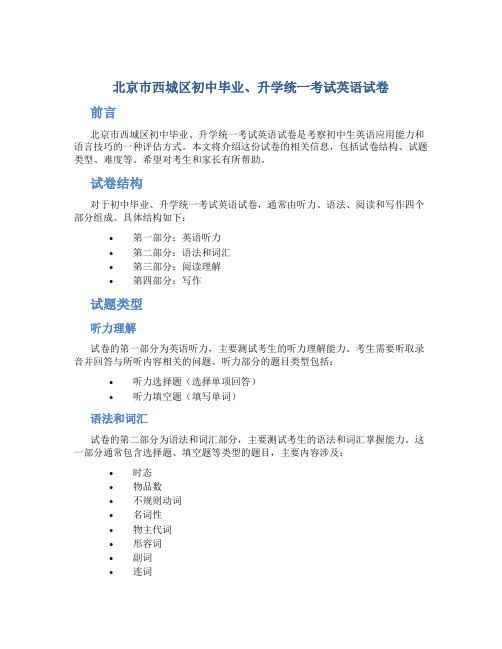
北京市西城区初中毕业、升学统一考试英语试卷前言北京市西城区初中毕业、升学统一考试英语试卷是考察初中生英语应用能力和语言技巧的一种评估方式。
本文将介绍这份试卷的相关信息,包括试卷结构、试题类型、难度等。
希望对考生和家长有所帮助。
试卷结构对于初中毕业、升学统一考试英语试卷,通常由听力、语法、阅读和写作四个部分组成。
具体结构如下:•第一部分:英语听力•第二部分:语法和词汇•第三部分:阅读理解•第四部分:写作试题类型听力理解试卷的第一部分为英语听力,主要测试考生的听力理解能力。
考生需要听取录音并回答与所听内容相关的问题。
听力部分的题目类型包括:•听力选择题(选择单项回答)•听力填空题(填写单词)语法和词汇试卷的第二部分为语法和词汇部分,主要测试考生的语法和词汇掌握能力。
这一部分通常包含选择题、填空题等类型的题目,主要内容涉及:•时态•物品数•不规则动词•名词性•物主代词•形容词•副词•连词•介词•冠词阅读理解试卷的第三部分为阅读理解,主要测试考生的阅读理解能力。
这一部分通常包含选择题、判断题等类型的题目,主要内容涉及:•短对话•短文阅读•长篇文章写作试卷的第四部分为写作,主要测试考生的写作能力。
这一部分通常包含:•书面表达•写作策略•写作过程•作文评价难度初中毕业、升学统一考试英语试卷整体难度适中,其中听力部分难度适中,语法和词汇考查基础知识,难度不大,阅读理解考察能力和语言表达能力,难度较高,而写作部分主要考察学生的写作素养和语言表达能力,难度较大。
总结对于即将参加北京市西城区初中毕业、升学统一考试英语的考生,需要认真准备,并合理安排复习进度。
希望本文对考生和家长在备考过程中有所帮助。
2011年北京中考英语真题及答案-整理版

2011年北京中考英语真题及答案-整理版2011年北京市高级中等学校招生考试英语试卷听力理解(共24分)知识运用(共27分)四、单项填空(共15分,每小题1分)从下面各题所给的A、B、C、D四个选项中,选择可以填入空白处得最佳选项。
21.I’m talking to you ,Jack. Please listen to carefully.A.meB.mineC.youD.yours22.Both parents were born 1970.A.atB.inC. onD.to23. Hurry up, you will miss the plane.A. andB. butC. soD. or24.----- do you play football?-----Once a week.A .How much B. How long C. How oftenD. How far25.We have a lovely room. It’s one of in the hotel.A. niceB. nicerC. nicestD. the nicest26.-----Can you ride a horse?-----No,IA. needn’tB. may notC. can’tD. mustn’t27.I knocked on the door but answered.A. somebodyB. nobodyC. anybodyD. everybody28. Paul and tennis yesterday. He did much better than I.. A. play B. will play C. playedD.are playing29.Where’s Tom ?His mother him now.A.is looking forB. will look forC. has looked forD. looks for30.----Excuse me, could you tell me how to Beijing Zoo?-----Well, you may take Bus No.27.A. getB. getsC. gettingD.to get31. M y aunt is a writer. She more than ten books since 1980.A. writesB. wroteC. has writtenD. will write32.----What were you doing this time yesterday?-----I on the grass and drawing a picture.A. sitB. satC. am sittingD. was sitting33.I will send you an e-mail as soon as I in Canada.A, arrive B. arrived C.am arrivingD. will arrive34. Many accidents by careless drivers last year.A. are causedB. were causedC. have causedD. will cause35.-----Do you know tomorrow?------At 8 o’clock.A. when did she comeB. when she cameC. when will she comeD. when she will come五、完形填空(共12分,每小题1分)“I can't believe what I'm hearing !”I thought to myself. Jeff was the last candidate(候选人)for president of Student Council .My best friend Tony come to me and said, “I'm sorry ,Mike.”I really thought you should be 36 ."Later that day , I happened to pass Jeff in the dining room. I offered him a 37 “congratulations”and walked to my usual table. To my surprise , Jeff put his plate beside38. A. proudly B. quickly C. nervously D. regretfully39. A. advice B. chance C. messageD. offer40. A. them B. him C. meD. us41. A. print B. invent C. createD. send42. A. for B. from C. withD. without43. A. carry out B.try out C. work out D. find out44. A. agreed B. wanted C. expectedD. asked45 A. allowed B. received C. introduced D. required46. A. pride B. surprise C. patienceD. hope47. A. luck B. spirit C. lifeD. success阅读理解(共44分)六、阅读下列短文,根据短文内容,从短文后各题所给的A、B、C、D四个选项中,选择最佳选项。
北京市西城区2011年高三4月一模英语试题(WORD精校版)

北京市西城区2011届高三一模考试英语试题本试卷共13页,共150分。
考试时长120分钟。
考试结束后,将本试卷和答题卡一并交回。
注意事项:1.考生务必将答案答在答题卡上,在试卷上作答无效。
2.答题前考生务必将答题卡上的姓名、准考证号用黑色字迹的签字笔填写。
3.答题卡上选择题必须用2B铅笔作答,将选中项涂满涂黑,黑度以盖住框内字母为准,修改时用橡皮擦除干净。
非选择题必须用黑色字迹的签字笔按照题号顺序在各题目的答题区域内作答,未在对应的答题区域内作答或超出答题区域作答的均不得分。
第一部分:听力理解(共三节,30分)第一节(共5小题;每小题1.5分,共7.5分)听下面5段对话。
每段对话后有一道小题,从每题所给的A、B、C三个选项中选出最佳选项。
听完每段对话后,你将有10秒钟的时间来回答有关小题和阅读下一小题。
每段对话你将听一遍。
例:What is the man going to read?A. A newspaper.B. A magazine.C. A book.答案是A。
1. Who is going to London?A. Peter.B. Tom.C. Kate.2. What is the man looking for?A. A bag.B. A camera.C. A toy.3. What will the woman do tonight?A. See a doctor.B. Watch a play.C. Prepare a meal.4. What is the possible relationship between the two speakers?A.Mother and son.B.Teacher and student.C.Driver and passenger.5.What’s the weather like today?A. Cloudy.B. Sunny.C. Snowy.第二节(共10小题;每小题1.5分,共15分)听下面4段对话或独白。
2024北京西城初三一模英语范文

2024北京西城初三一模英语范文The year 2024 marks a significant milestone for the city of Beijing as it prepares to host the 2024 Summer Olympics. As a student in the Xicheng District of Beijing, I have been eagerly anticipating this event and the opportunities it will bring to our community. In this essay, I will discuss my thoughts and reflections on the impact of the 2024 Olympics on our local community and the importance of English language proficiency in this global event.The announcement of Beijing as the host city for the 2024 Summer Olympics has generated a sense of excitement and pride within our community. As a resident of the Xicheng District, I am thrilled to witness the transformation of our city as it prepares to welcome athletes, spectators, and media from around the world. The influx of visitors and the increased international attention will undoubtedly bring about significant changes to our daily lives and the infrastructure of our city.One of the most notable impacts of the 2024 Olympics will be the need for improved public transportation and infrastructure. The cityhas already begun investing in the expansion of its metro system, the construction of new roads, and the renovation of existing facilities to accommodate the expected influx of visitors. These improvements will not only benefit the athletes and spectators during the Games but also enhance the quality of life for the local residents long after the event has concluded.Moreover, the 2024 Olympics will provide a unique opportunity for the Xicheng District to showcase its rich cultural heritage and attract global attention. The district is home to numerous historical landmarks, such as the Forbidden City, the Temple of Heaven, and the Summer Palace, all of which are expected to be featured prominently during the Games. This exposure will not only promote tourism but also foster a greater appreciation for our local history and traditions among both domestic and international visitors.Alongside the physical and cultural transformations, the 2024 Olympics will also have a significant impact on the educational landscape of the Xicheng District. As a student, I am particularly excited about the opportunities that will arise for us to engage with the global community and enhance our language skills. The need for multilingual communication during the Games will create a demand for proficient English speakers, and our schools have already begun to prioritize the development of English language proficiency among students.One of the key initiatives implemented by our district is the integration of English-language instruction across various subjects. Instead of solely focusing on language classes, our teachers are now incorporating English into the curriculum for subjects such as mathematics, science, and history. This approach not only improves our overall English language skills but also helps us to better understand and communicate complex ideas in a global context.Furthermore, our schools have established partnerships with international organizations and educational institutions to provide students with opportunities to engage in cultural exchange programs, language immersion experiences, and collaborative learning projects. These initiatives not only enhance our language skills but also foster a greater understanding and appreciation for diverse cultures and perspectives.As a student in the Xicheng District, I have personally benefited from these educational initiatives and have witnessed the transformative impact of the 2024 Olympics on our community. Through my participation in English language programs and exposure to international visitors, I have gained a deeper understanding of the importance of effective communication in a globalized world.Moreover, the 2024 Olympics have inspired me to pursue a career infields that will allow me to contribute to the success of this event and the continued development of our city. I am particularly interested in the fields of event management, tourism, and international relations, as these areas will play a crucial role in the organization and execution of the 2024 Games.In conclusion, the 2024 Olympics have presented the Xicheng District with a unique opportunity to transform our community and showcase our rich cultural heritage to the world. As a student, I am excited to be a part of this journey and to contribute to the success of this global event. The focus on English language proficiency and the integration of international collaboration in our educational system will not only benefit us during the Games but also prepare us for the challenges and opportunities of the 21st century. I am confident that the Xicheng District will rise to the occasion and demonstrate its commitment to excellence, innovation, and global engagement.。
2011年北京市中考英语试题与答案
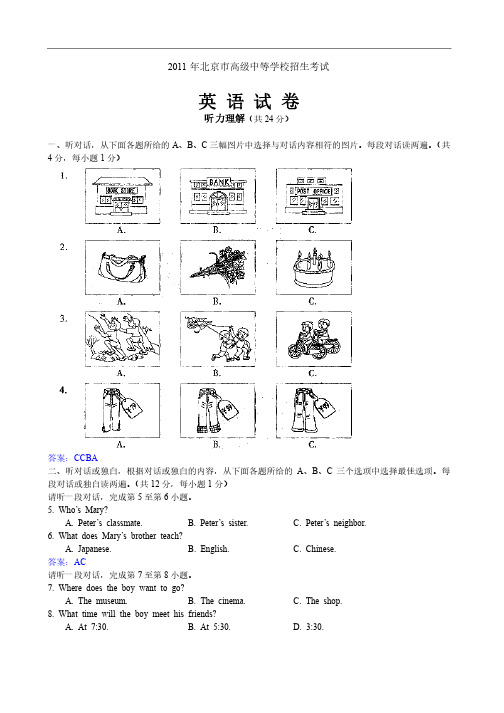
2011年北京市高级中等学校招生考试年北京市高级中等学校招生考试英语试卷听力理解(共24分)分)一、听对话,从下面各题所给的A、B、C三幅图片中选择与对话内容相符的图片。
每段对话读两遍。
(共4分,每小题1分)分)答案:CCBA 二、听对话或独白,根据对话或独白的内容,从下面各题所给的A、B、C三个选项中选择最佳选项。
每分)段对话或独白读两遍。
(共12分,每小题1分)小题。
请听一段对话,完成第5至第6小题。
5. Who’s Mary?A. Peter’s classmate.B. Peter’s sister.C. Peter’s neighbor.6. What does Mary’s brother teach?A. Japanese. B. English. C. Chinese. 答案:AC 小题。
请听一段对话,完成第7至第8小题。
7. Where does the boy want to go? A. The museum. B. The cinema. C. The shop. 8. What time will the boy meet his friends? A. At 7:30. B. At 5:30. D. 3:30. Time Activities 17. on _________ visit his parents at noon 18. go out for ________ in the afternoon 19. play sports for ______ at night 20. __________ 【解析】本题是对人称代词的考查,该处作宾语应该使用宾格形式。
22. Both my parents were born ______ 1970. A. at B. in C. on D. to 答案:B 【解析】本题是对介词的考查,在年代前面用介词in. 23. Hurry up, ______ you will miss the plane. A. and B. but C. so D. or 答案:D 【解析】本题是对连词的考查,前句的意思是“快点”,后句是“你将错过飞机的”,可以推出此处填or,“否则,要不然”的意思。
北京市西城区2011九年级第一学期期末英语试卷
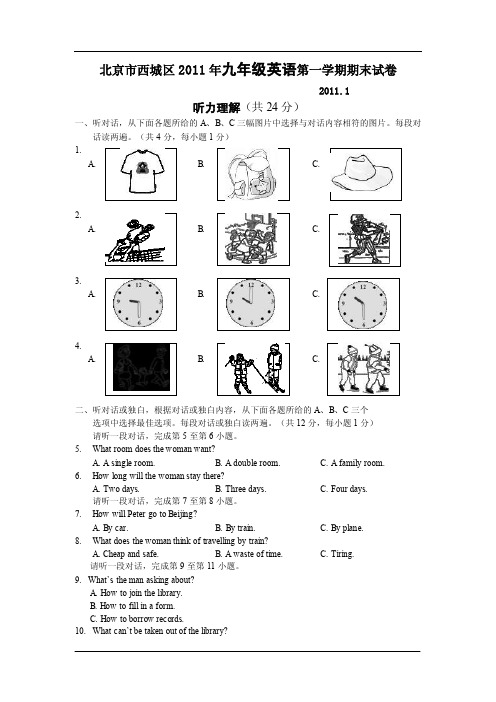
北京市西城区2011年九年级英语第一学期期末试卷2011.1听力理解(共24分)一、听对话,从下面各题所给的A、B、C三幅图片中选择与对话内容相符的图片。
每段对话读两遍。
(共4分,每小题1分)1.A. B. C.2.A. B. C.3.A. B. C.4.A. B. C.二、听对话或独白,根据对话或独白内容,从下面各题所给的A、B、C三个选项中选择最佳选项。
每段对话或独白读两遍。
(共12分,每小题1分)请听一段对话,完成第5至第6小题。
5. What room does the woman want?A. A single room.B. A double room.C. A family room.6. How long will the woman stay there?A. Two days.B. Three days.C. Four days.请听一段对话,完成第7至第8小题。
7. How will Peter go to Beijing?A. By car.B. By train.C. By plane.8. What does the woman think of travelling by train?A. Cheap and safe.B. A waste of time.C. Tiring.请听一段对话,完成第9至第11小题。
9. What‟s the man asking about?A. How to join the library.B. How to fill in a form.C. How to borrow records.10. What can‟t be taken out of the library?A. Magazines.B. Books.C. Newspapers.11. What can the man do if he wants to keep the books longer?A. Come to the library.B. Make a phone call.C. Send an email.请听一段对话,完成第12至第13小题。
2011年全国卷英语听力原文加答案
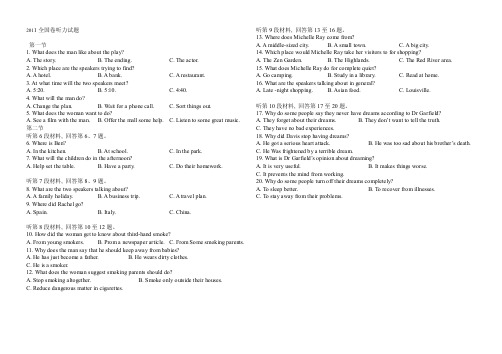
2011全国卷听力试题第一节1. What does the man like about the play?A. The story.B. The ending.C. The actor.2. Which place are the speakers trying to find?A. A hotel.B. A bank.C. A restaurant.3. At what time will the two speakers meet?A. 5:20.B. 5:10.C. 4:40.4. What will the man do?A. Change the plan.B. Wait for a phone call.C. Sort things out.5. What does the woman want to do?A. See a film with the man.B. Offer the mall some help.C. Listen to some great music. 第二节听第6段材料, 回答第6、7题。
6. Where is Ben?A. In the kitchen.B. At school.C. In the park.7. What will the children do in the afternoon?A. Help set the table.B. Have a party.C. Do their homework.听第7段材料, 回答第8、9题。
8. What are the two speakers talking about?A. A family holiday.B. A business trip.C. A travel plan.9. Where did Rachel go?A. Spain.B. Italy.C. China.听第8段材料, 回答第10至12题。
北京市西城区2010—2011学年度第一学期期末试卷(北区)八年级英语(B卷)

北京市西城区2010—2011学年度第一学期期末试卷(北区)八年级英语(B卷) 2011. 1听力理解(共15分)一、听对话,选出与对话内容相符的图片。
每段对话读两遍。
(共4分。
每小题1分)二、听对话。
根据对话内容,从下面各题所给的A、B、C三个选项中选择最佳选项。
每段对话读两遍。
(共7分,每小题1分)5. When did Mike clean his room?A. At 5:00 pm.B. At 3:00 pm.C. At 7:00 pm.6. What did the boy do yesterday afternoon?A. He read a book.B. He chatted online.C. He did his homework.7. What is the man going to buy for his brother?A. A model plane.B. A toy car.C. A storybook.8. Where is Jack now?A. In France.B. In China.C. In Japan.9. What is Mary going to do at the party?A. Take photos.B. Sing a song.C. Play the violin.请听一段对话,完成第10至第11小题。
10. What does Bob think of his Chinese class?A. It’s larger than Sally’s classes.B. It’s smaller than Sally’s classes.C. It’s as large as Sally’s classes.11. Why does Sally think Bob is lucky?A. Because he doesn’t have to run between buildings.B. Because he has taken the Chinese class in the university.C. Because he has the classmates from different countries.三、听独白,根据所听到的内容和提示词语,记录关键信息。
初三中考英语2011年下城区一模试卷

下城区2011年初三中考模拟测试英语考生须知:1、本试卷满分120分,考试时间100分钟。
2、答题前,在答题纸上写姓名、学校,并填涂考号(学号)。
3、必须在答题纸的对应答题位置答题,写在其他地方无效。
1至60小题在答题纸上涂黑作答,答题纸答题方式详见答题纸上的说明。
4、做听力题时,先将答案划在试卷上。
录音内容结束后,你将有一分钟的时间将试卷上的答案转涂到答题纸上。
5、考试结束后;试卷和答题纸一并上交。
试题卷听力部分(25分)一、听小对话回答问题(共5小题,计5分)听下面五段小对话,回答第1至第5五个小题。
现在,你有25秒钟的时间阅读这五题。
1.Why does Bob look sad?A. He was ill.B.He didn't do well in his study.C.He got a good mark.2. Where are the tickets? ,A. In the bag.B.At home.C.At school.3. What does Lucy herself want to be?CA.A teacher.B.A nurse.C.A reporter.4. Which animals does Lisa like best? 。
A. Monkeys.B.Pandas, elephants and cats.C.Dogs.5.What day is it today?A. Monday.B.Wednesday.C.Saturday.二、听对话回答问题(共6小题,计12分)听下面一段对话,回答第6至第8三个小题。
现在,你有15秒钟的时间阅读这三题。
. 6. Who did Hector spend Saturday with7A. His friend.B.Holly. C:His father.7. Why did Hector miss the camp?A. Because he had a football match.B. Because he got up too late.C. Because he didn't know the time.8. What do you learn from the conversation? ’A. Hector played with his dad in the garden.B. Hector had a nice day offC. Hector didn't enjoy his Saturday.听下面一段对话,回答第9至第11三个小题。
中考英语听力模拟试题(三)含听力材料听力音频文件MP3文件下载
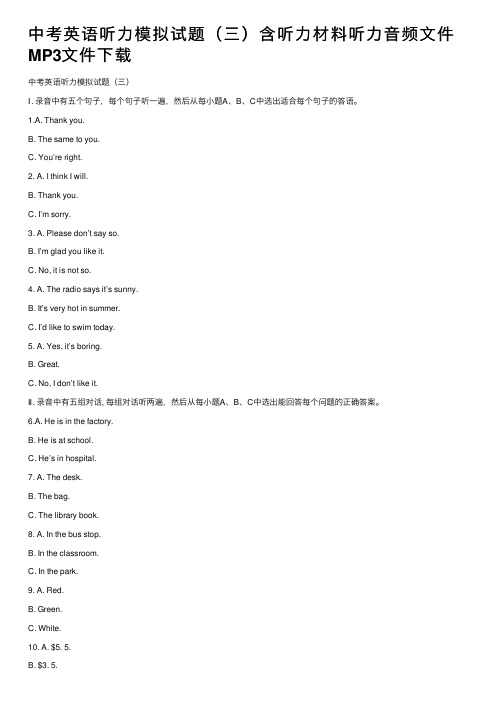
中考英语听⼒模拟试题(三)含听⼒材料听⼒⾳频⽂件MP3⽂件下载中考英语听⼒模拟试题(三)Ⅰ. 录⾳中有五个句⼦,每个句⼦听⼀遍,然后从每⼩题A、B、C中选出适合每个句⼦的答语。
1.A. Thank you.B. The same to you.C. You’re right.2. A. I think I will.B. Thank you.C. I’m sorry.3. A. Please don’t say so.B. I’m glad you like it.C. No, it is not so.4. A. The radio says it’s sunny.B. It’s very hot in summer.C. I’d like to swim today.5. A. Yes, it’s boring.B. Great.C. No, I don’t like it.Ⅱ. 录⾳中有五组对话, 每组对话听两遍,然后从每⼩题A、B、C中选出能回答每个问题的正确答案。
6.A. He is in the factory.B. He is at school.C. He’s in hospital.7. A. The desk.B. The bag.C. The library book.8. A. In the bus stop.B. In the classroom.C. In the park.9. A. Red.B. Green.C. White.10. A. $5. 5.B. $3. 5.C. $6. 5.Ⅲ. 听两段长对话,选择正确答案,每段对话读两遍。
听第⼀段对话,回答第11、12⼩题。
11.A. Reading.B. Traffic.C. Sports.12. A. 14 minutes.B. 40 minutes.C. I don’t know.听第⼆段对话,回答第13~15⼩题。
2011北京市西城区初三英语二模试题及答案
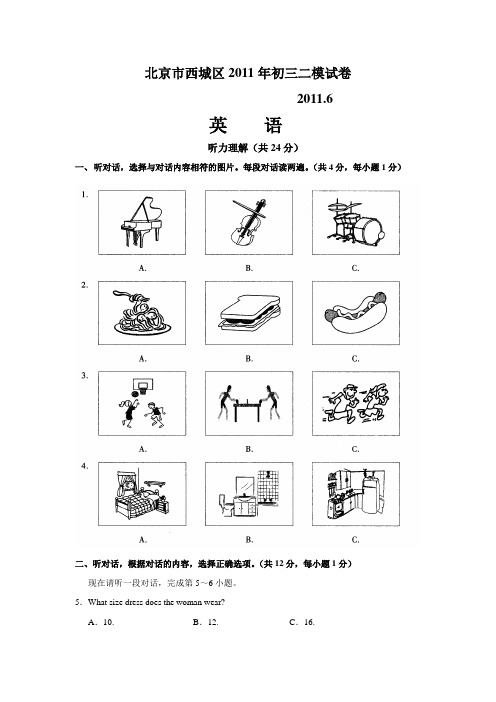
北京市西城区2011年初三二模试卷2011.6英语听力理解(共24分)一、听对话,选择与对话内容相符的图片。
每段对话读两遍。
(共4分,每小题1分)二、听对话,根据对话的内容,选择正确选项。
(共12分,每小题1分)现在请听一段对话,完成第5~6小题。
5.What size dress does the woman wear?A.10. B.12. C.16.6.Why doesn’t the woman try on the dress?A.There isn’t one in her size.B.She doesn’t like the color.C.It is a bit expensive.现在请听一段对话,完成第7~8小题。
7.What’s the weather like today?A.Rainy. B.Cloudy. C.Sunny.8.Why doesn’t the man like the rainy day?A.He has to take an umbrella.B.He can’t wear the shoes he likes.C.He can’t walk after dinner in the park.现在请听一段对话,完成第9~10小题。
9.What’s the man planning to do this afternoon?A.Go swimming. B.Work on his article. C.Study a lot for English. 10.What does the woman offer to do for the man?A.To write a novel for him.B.To teach him for study.C.To help him with his history.请听一段对话,完成第11~13小题。
11.What were the speakers doing just now?A.Taking notes. B.listening to a lesson. C.Reading the materials. 12.What does the woman advise the man to do before the lesson?A.Read the materials generally.B.Get the main idea of the lesson.C.Discuss with his classmates.13.What should the man do when taking notes according to the woman?A.To spend a lot of time reading the materials.B.To write down every word the teacher says.C.To pay attention to how the teacher organizes the materials.请听一段独白,完成第14~16小题。
- 1、下载文档前请自行甄别文档内容的完整性,平台不提供额外的编辑、内容补充、找答案等附加服务。
- 2、"仅部分预览"的文档,不可在线预览部分如存在完整性等问题,可反馈申请退款(可完整预览的文档不适用该条件!)。
- 3、如文档侵犯您的权益,请联系客服反馈,我们会尽快为您处理(人工客服工作时间:9:00-18:30)。
第Ⅰ卷(三部分,共115分)
第一部分:听力(共两节,满分30分)
第一节(共5小题;每小题1.5分,满分7.5分)
听下面5段对话。
每段对话后有一个小题,从题中所给的A、B、C三个选项中选出最佳选项,并标在试卷的相应位置。
听完每段对话后,你都有10秒钟的时间来回答有关小题和阅读下一小题。
每段对话仅读一遍。
1. Where did this conversation most probably take place?
A. in a library
B. in a theatre
C. at a church
2. How long ago did the man leave home?
A. 30 minutes
B. 60 minutes
C. 90 minutes
3. What would be the woman’s advice?
A. boil the water before you drink it
B. don’t use ice in your drink
C. something goes wrong with your stomach
4. How does the man’s coat compare to his brother’s?
A. larger
B. smaller
C. the same size
5. How does the man feel about the class?
A. he doesn’t like it
B. he doesn’t have to take it
C. he is used to it
第二节
听第6段材料,回答6-7题
6. The dialogue was between
A. two drivers
B. husband and wife
C. driver and policeman
7. Who put curtains on the front window?
A. the driver
B. the driver’s wife
C. the policeman
听第7段材料,回答8-11题
8. How long has the man been waiting?
A. 10 minutes
B. half an hour
C. 20 minutes
9. When’s the show supposed to start?
A. 9: 20
B. 9: 30
C. 9: 40
10. What is the time now ?
A. 9: 10
B. 9: 20
C. 9: 30
11. What did the woman do today?
A. she did some shopping
B. she did some sewing (缝纫)
C. she did some washing
听第8段材料,回答12-14题
12. Alice likes the man’s old apartment because
A. it was modern
B. it was near his job
C. the neighbors helped him
13. The man moved because he
A. found a cheaper apartment
B. didn’t like his old neighbors
C. wanted to be close to his job
14. Alice had lived in an apartment where
A. things weren’t fixed quickly
B. the rent (房租)was cheap
C. the neighbors were friendly
听第9段材料,回答15-17题
15. Bob’s father describes sports events
A. in a newspaper column
B. on television
C. on the radio
16. What would the woman like to study at the university?
A. English
B. international relations
C. she hasn’t decided yet
17. The woman speaks English well because
A. it’s easy for her
B. she has worked hard
C. she is almost a native 听第10段材料,回答18-20题
18. How long is it sometimes necessary for the writer to wait for a bus?
A. ten minutes
B. half an hour
C. one hour
19. What is the number of passengers a bus may carry?
A. 20
B. 40
C. 60
20. Why has the person written this letter?
A. he wants the bus services to be improved
B. he wants the police to punish the bus driver
C. he wants the passengers to consider whether or not to travel by bus
第二部。
